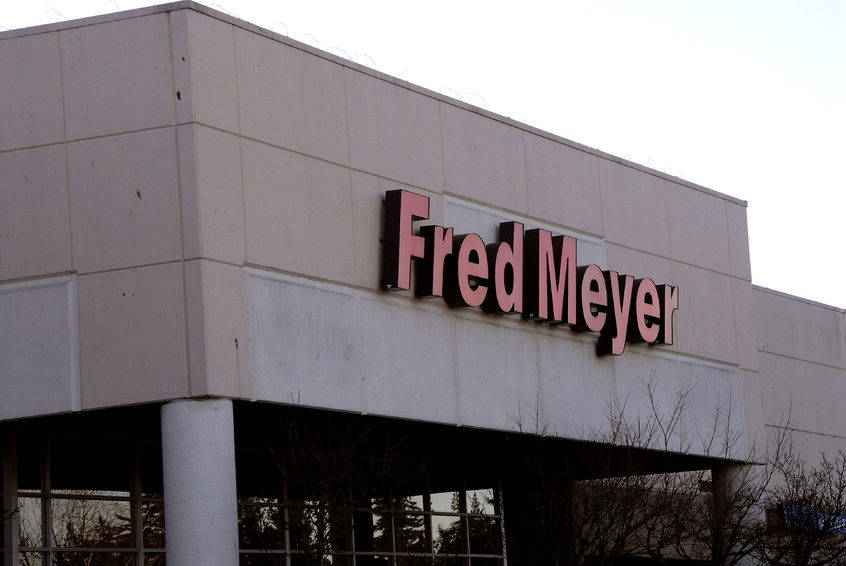NEW YORK — Kroger will no longer sell guns to anyone under 21 at the stores it owns, becoming the third major retailer this week to put restrictions in place that are stronger than federal laws. The moves by Dick’s Sporting Goods and Walmart — and retribution on Delta by lawmakers — emphasizes the pressure companies are facing to take a stand.
The nation’s largest grocery chain has sold guns from 44 of its Fred Meyer stores in Alaska, Oregon, Washington and Idaho, but said Thursday that since a mass shooting last month at a Florida high school that killed 17 people, it’s become clear that gun retail outlets must go beyond what current U.S. laws requires.
The company ended sales of assault-style guns everywhere but Alaska several years ago. Special orders for those guns are now unavailable in Alaska.
“In response to the tragic events in Parkland and elsewhere, we’ve taken a hard look at our policies and procedures for firearm sales,” Kroger Co. said in a release.
The change comes one day after Walmart and Dick’s Sporting Goods, both prominent gun sellers, tightened their company policies, and also a day after students returned to Marjory Stoneman Douglas High School in Parkland, Florida, for the first time since the shooting there.
Companies like Dick’s had already changed gun-sale policies in the wake of the 2012 Sandy Hook Elementary School shooting in Connecticut, but the Parkland shooting has opened a fissure between a portion of corporate America and organizations like the National Rifle Association.
MetLife, Hertz and Delta Air Lines and other major U.S. corporations have already cut ties with the National Rifle Association, and at some political risk. Georgia lawmakers passed a bill Thursday that effectively punishes Delta Air Lines for cutting ties with the NRA, following through on Republican vows to deny a tax break worth an estimated $38 million for the company after it ended discounts for NRA members in the wake of the most recent school massacre.
One industry analyst said after the announcement from Dick’s, and strong words from its CEO about the need for change, that other retailers that devote a small percentage of their business to hunting will probably follow suit.
“It is a risky game but you can’t please everyone,” said Joseph Feldman, a senior managing director at Telsey Advisory Group.
The announcements from Walmart and Dick’s so far have drawn hundreds of thousands of responses on social media for and against the moves, from those who pledged to buy more from one company to campaigns urging people to thank the companies for their decisions to those who vowed never to buy from them again.
Other companies have tried to stay out of the debate. Some gun sellers haven’t responded to requests for comment, including Bass Pro Shops, which owns Cabela’s, or Camping World Holdings, which owns Gander Outdoors. The Outdoor Industry Association hasn’t responded to requests for comment. L.L. Bean also didn’t respond to a message Thursday.
Besides major chains, guns are also bought from gun shows, local stores and from online stores.
“If large retailers, like Dick’s, reduce their exposure to guns, it could impact gun manufacturers,” says Maksim Soshkin, a senior analyst at IBISWorld. “Manufacturers could see a decrease in sales or have to find new avenues to sell their product.”
American Outdoor Brands, which owns Smith & Wesson, said Thursday it expects gun sales to be more or less flat for the next year to 18 months. The company’s third-quarter results and fourth-quarter forecasts were much weaker than Wall Street expected, and its stock fell 19 percent in aftermarket trading, while Sturm, Ruger fell 9 percent.
Kroger, based in Cincinnati, said it has been tweaking some of its gun departments as it renovates stores due to softer demand from customers. The company ended sales of assault-style rifles at Fred Meyer several years ago in Oregon, Washington and Idaho. It will extend that ban to Alaska, where customers could get such guns via special order.
The NRA, which also didn’t respond to request for comment Thursday, has pushed back on calls for raising age limits for guns or restricting the sale of assault-style weapons.
Could a person between the ages of 18 and 21 challenge the companies over the new policies and argue that they are discrimination based on age? Some experts say retailers can set age restrictions without violating the Second Amendment.
Los Angeles-based attorney Angela Reddock-Wright, who focuses on workplace discrimination disputes, said anti-discrimination laws mostly protect people 40 and older from being fired based on their age. Mike Glassman, who chairs the employment law group at the Cincinnati-based firm Dinsmore & Shohl, said the Second Amendment “only limits the government and not private entities.”

